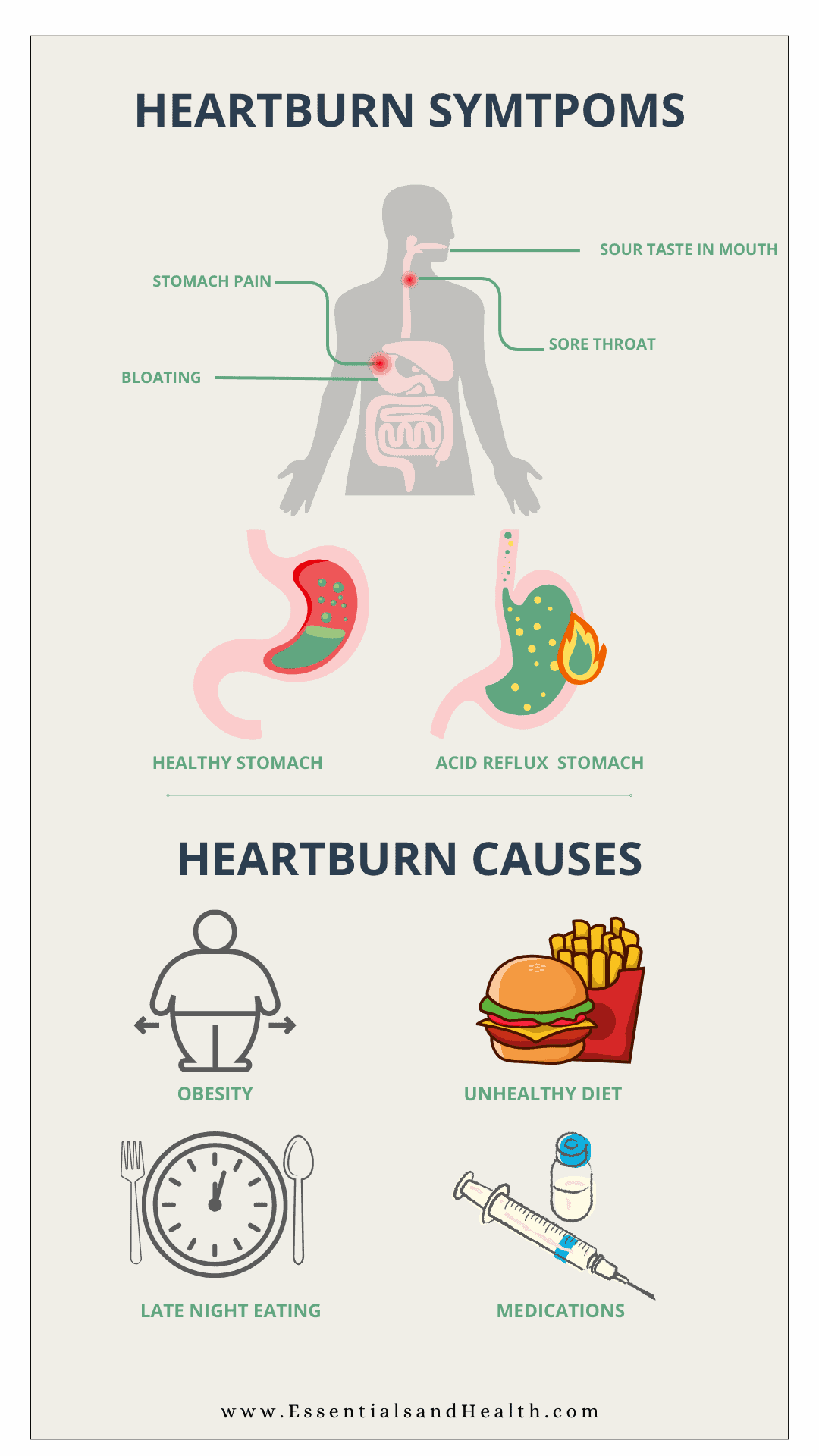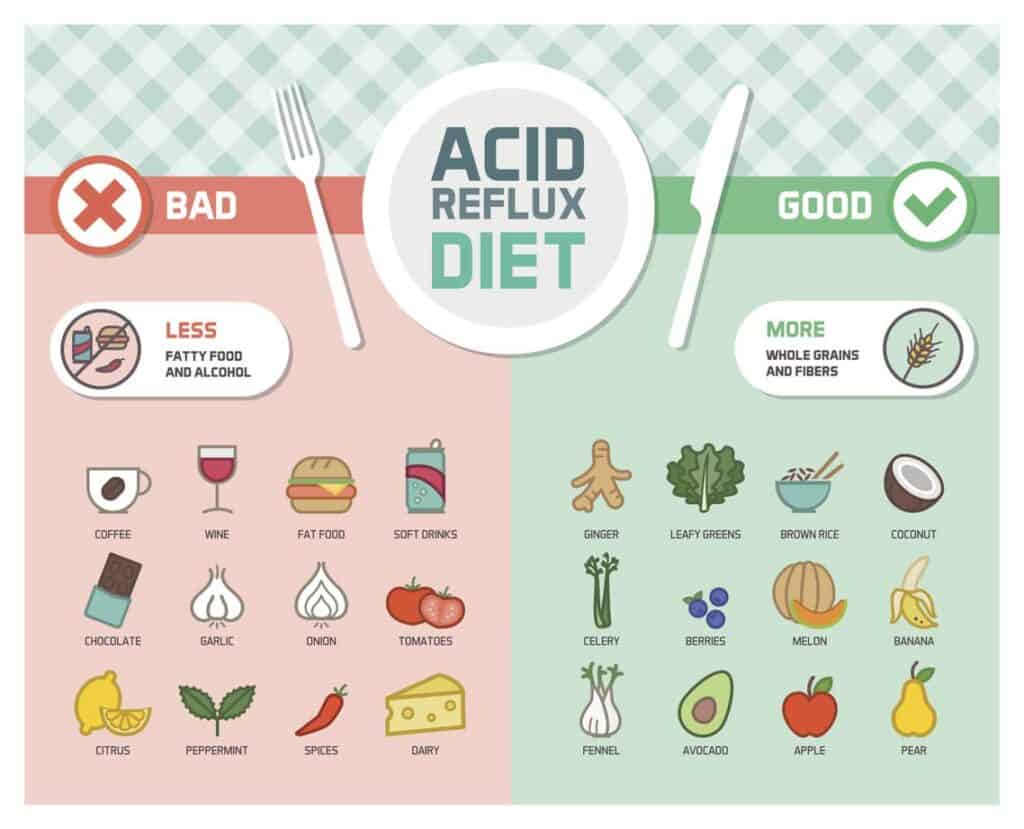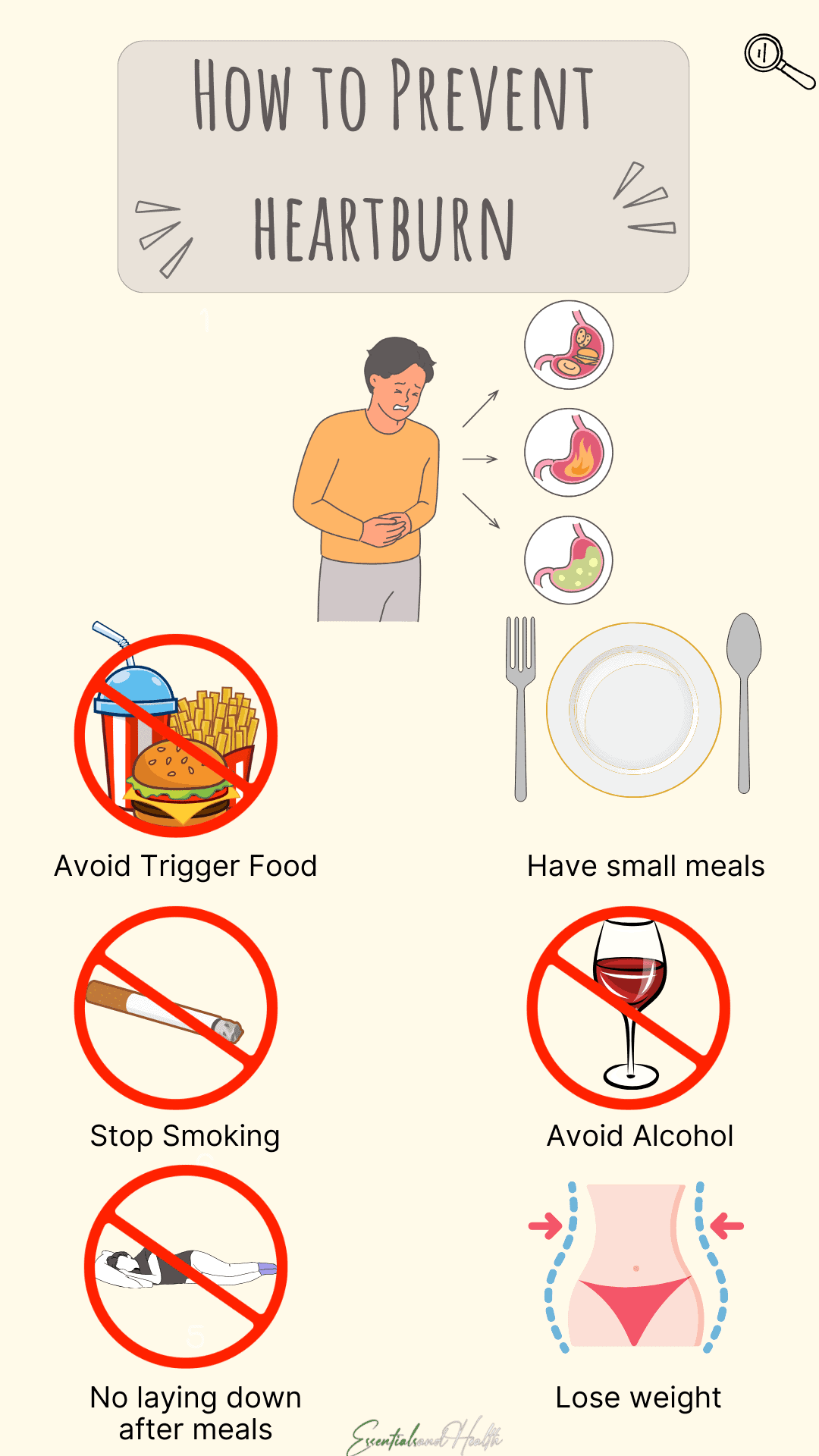Heartburn No More: Natural Home Remedies to Soothe Your Stomach
Our content is reader-supported. This means we’ll receive a small commission if you purchase through one of the product links. This helps support the website and allows us to continue creating blogs like this one. Thank you in advance for the support!
The American College of Gastroenterology estimated that about 20% of the US population suffers from heartburn once per month.
Heartburn or acid reflux is a common discomfort described as a burning sensation in the chest or throat area.
It is a chronic ailment that affects millions worldwide.
While medications are sensible options, homemade remedies tend to give us a natural way of dealing with our heartburn struggles.
This article will examine several natural approaches to treating this chronic condition and discuss their effectiveness in relieving those who are experiencing it.
From everyday kitchen ingredients or local supermarket ingredients to simple lifestyle adjustments.
These easy-to-make homemade remedies will help to extinguish the burning flames that cause those heartburn misery.
Let us start from the beginning:
What is Heart Burn?
Commonly referred to as acid reflux, heartburn is a painful, burning sensation in the middle of the chest.
It lasts a few minutes, and some people experience this discomfort from the back of their throats.
Heartburn occurs when stomach acid and the esophagus lining come into contact.
The esophagus is a hollow, muscular tube located behind the windpipe. It is the passageway through which food travels from our throats to our stomachs.
Symptoms normally occur after having a meal and can sometimes last from a few minutes to even a few hours. They usually subside after the digestion process has ended.
What causes Heartburn?
During the swallowing process, the muscles in our throat relax and allow food to enter an area known as the upper esophageal sphincter (UES).
This muscular ring is located at the top of our esophagus, which allows food to enter the esophagus.
In a process known as peristalsis, food is then moved downwards where the esophagus contracts in waves, pushing the food down to the lower esophageal sphincter (LES).
This is the muscular ring at the bottom of the esophagus. To allow the entrance food to enter the LES would then relax.
Heartburn occurs when the LES muscles don’t close correctly, which causes stomach acids to travel into the esophagus (acid reflux).
These acids irritate the inner lining of the esophagus, leading to the burning sensation that people experience.
Anyone can experience heartburn, as it is an occasional ailment. However frequent heartburn encounters may indicate a chronic disease known as GERD (gastroesophageal reflux disease).
The Heartburn Sensation
The most common description of heartburn is a burning discomfort in the chest or throat areas according to the information we found on Tums.com.
This discomfort then spreads from the upper stomach to the throat, causing one to feel like food is stuck in the chest or throat.
Sometimes it causes individuals difficulties swallowing and has a sour or acidic taste.
These sensations are known to intensify while bending over or lying down.
The burning sensation can range from mild to extreme. Although it is called “heartburn,” this condition is unrelated to the heart.
Heartburn Trigger Foods:
Our diet is a crucial component of our well-being. The type and quantity of food we consume can either be planting the seeds for acid reflux or helping us to keep it under control.
Whereas they vary for each person, here we identify a few common ones:
Spicy Foods: These food items are high on our list as they have great potential to cause heartburn due to their high acidity which will irritate the lining of the esophagus.
Fatty Food: Food that is greasy and high in fat contents will make the digestion process longer. This can cause the LES to relax which can cause acid reflux.
Citrus Fruits: Food items such as citrus fruits and fruit juices are high in acidity, which is known to contribute to heartburn.
Garlic and Onions: When consumed in large quantities, garlic and onions can trouble the LES by relaxing it, leading to acid reflux.
Tomatoes and their derivatives: Tomatoes are acidic and so are their derivatives. Acidic food will cause heartburn.
A nutritious, balanced diet, one rich in fiber and low in trigger food will minimize heartburn symptoms.
Lifestyle habits that can trigger Heartburn
Similar to the trigger foods, these lifestyle habits may vary for each person:
Smoking: Smoking is a known contributor to heartburn as it tends to relax the LES muscles which will increase the chances of a heartburn.
Overindulging: Consuming excessive amounts of food means that our stomachs must work harder to digest the food, putting greater pressure on the LES muscles.
Eating then Reposing: Lying down whilst digestion is in place is not a great idea, since this can cause our stomach acids to flow back into the esophagus.
This is the primary reason heartburn tends to be more severe at night.
After eating, we recommend waiting at least three hours before lying down.
Eating too fast: One that a lot of us are guilty of, this lifestyle habit will put excessive pressure on the LES muscles.
Medication that can Trigger Heartburn
Although certain medications can contribute to heartburn, we must emphasize that not everyone will experience this side effect.
With that said, here are several medications that can irritate the esophagus and lead to heartburn:
Calcium Channel Blockers: Procardia Nifedipine and Norvasc Amlodipine are two medications that are used to treat high blood pressure and can cause heartburn as they are known to relax the LES.
Antibiotics: Doxycycline and Tetracycline have the potential to cause heartburn in some people as they are known to irritate the lining of the esophagus.
Nitrates: Nitrates are used to treat chest pain that is caused by angina. They function as a form of relaxant for the arteries and bring on heartburn as they relax the LES.
Opioids: Opioid medications such as Codeine, Oxycodone, and Morphine can contribute to acid reflux as they slow down the digestion process and relax the LES as well.
Bisphosphonates: Examples include Actonel Risedronate, Boniva Ibandronate, and Fosamax Alendronate.
These medications are used to prevent and treat osteoporosis. They can induce heartburn in two ways:
One of their side effects is that they can slow down the digestion process.
This means that there is a higher chance of stomach acids being trapped in the esophagus.
The second is that Bisphosphonates can also irritate the lining of the esophagus, which will lead to acid reflux.
Theophylline: Theophylline is a medication used to control asthma, by relaxing the muscles in the airways to enhance breathing.
The side effect of this medicine is that it can also relax the LES muscles.
We advise speaking to a medical expert if you are on any of the medications listed and are experiencing heartburn.
The Connection Between Weight and Heartburn
An overweight or obese person has a higher risk of experiencing heartburn, as obesity increases pressure on the stomach and the LES.
Excessive belly fat can also cause the development of a hiatal hernia, a condition we will cover later in this article.
Obesity is one of the biggest factors that contribute to heartburn. We found a study on obesityaction.org that detailed the relationship between weight management and heartburn.
Overweight or obese persons saw that their heartburn symptoms disappeared by reshaping their diets, becoming actively involved in physical activities, and adopting positive lifestyle habits.
Proper weight management is crucial and provides several benefits that go beyond aesthetics.
Remember that every day offers you a new opportunity to get in line with your weight management goals.
The Connection Between Sleep and Heartburn
Sleep is another crucial aspect of our lives and it can have a significant relationship with heartburn.
Many people describe their symptoms as being more severe during sleep. For example, lying down right after a meal is an unhealthy practice that will trigger or make worse the symptoms of heartburn.
So that means no late-night meals or no meals within 2 or 3 hours before going to bed.
This practice will ensure proper digestion which will eliminate the possibility of the example listed above.
Sleeping with the upper body elevated is also a good practice. This will reduce the chances of acid reflux during sleep.
According to Sleepfoundation.com, sleeping on your left side can also help.
The Connection Between Smoking and Heartburn
The connection between smoking and heartburn has been long-established. Our saliva contains a very crucial component known as bicarbonate.
This chemical plays an important role in the digestive system as it enhances the process by counteracting stomach acid which contributes to acid reflux.
In short, smoking reduces the production of the production of saliva, which leads to increased acid production.
Not only that, it irritates the esophagus and increases its sensitivity to stomach acid.
Smoking also relaxes the LES which will increase the chance of acid reflux.
Physical conditions that can trigger Heartburn
Pregnancy
During pregnancy, the progesterone hormone causes the valve at the entrance of the stomach to relax. This lowers the LES which allows stomach acid to flow back into the esophagus, leading to heartburn.
Although uncomfortable, heartburn during pregnancy is generally harmless.
Hiatal Hernia
This condition occurs when part of the stomach extends upwards, through the diaphragm into the chest.
This increases a person’s chances of heartburn, as this condition weakens the LES muscles.
Hiatal Hernia will also prevent the LES from closing properly, due to the presence of the stomach bearing down on it.
Gastroparesis
This physical condition occurs when our stomach muscles do not function effectively. This affects the natural digestion process as food moves slower than usual.
Gastroparesis and heartburn are linked indirectly, as it can bring about conditions that increase the likeliness of heartburn. For example:
Delayed stomach emptying: When digestion takes longer than usual, there is a greater chance that the stomach acid may leak back into the esophagus.
Greater Chances of Acid Reflux: With food staying longer than usual in the stomach, there is a greater production of stomach acid.
Homemade Remedies for Heartburn
Here are a few homemade remedies for your heartburn to help soothe your stomach and quench that burning discomfort:
Sugar-free chewing gum: Studies show that chewing sugar-free gum encourages saliva production. As mentioned earlier, saliva contains bicarbonate which acts as a natural filter for stomach acid.
Ginger: Ginger is another useful remedy to counter heartburn.
Whether you are drinking the tea variant or the raw variant, it has anti-inflammatory properties that will combat stomach acids and soothe the digestive tract.
Chamomile Tea: Chamomile is a very popular tea used to treat a great number of afflictions. It has anti-inflammatory properties which will help to minimize inflammation brought on by acid reflux.
Aloe Vera Juice: Another herb possessing anti-inflammatory properties. Aloe Vera Juice is believed to be able to soothe discomforts caused by heartburn.
Deglycyrrhizinated licorice: DGL is a special form of extract that comes from licorice roots. This herb has the potential to alleviate heartburn, by enhancing the production of the mucous found on the lining of the esophagus.
Marshmallow Root: Another natural root that reduces heartburn by forming a protective coating on the stomach and the esophagus.
The dietary supplement Gut Vita offers natural heartburn relief through a unique combination of plants, minerals, herbs, and prebiotic ingredients designed to support digestive comfort.
The items listed above are generally considered safe. However, even though they are known to help with heartburn, remember that these homemade remedies may not work for everyone.
Conclusion
The homemade remedies covered in this blog will empower individuals to manage their heartburn challenges better.
Heartburn that occurs two or more days per week is considered frequent.
It is vital to treat heartburn to avoid further complications, as we know that acid reflux will eventually cause damage to the esophagus over time.
With that said, these remedies may not work for everyone. Reach out to a medical specialist if you suffer from severe or persistent heartburn.
Which homemade remedies do you use for your heartburn?















